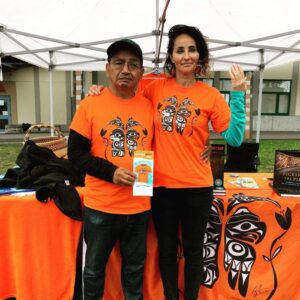The National Day for Truth and Reconciliation is on September 30, and it’s an important first step for the Canadian government toward making amends with our Indigenous communities. However, there is still much more to be done.
After decades of ignoring and diminishing the generational impact of residential schools and the stories of survivors, the National Day for Truth and Reconciliation is Canada’s most prominent acknowledgement of its mistakes.

This is the second year that the National Day for Truth and Reconciliation is a statutory holiday. Post-secondary schools across Canada will have the day off, so it’s important to take time on this day to acknowledge all the lives of Indigenous children who were lost and the culture that was stolen from them.
As a community, we must keep conversations about these horrors and tragedies alive rather than pushing them back into the past because they paint our country in a bad light. While these events happened decades ago, they are not finished, because Indigenous people across Canada still feel the repercussions today.
Once again, this holiday for remembrance is only a start toward making amends with Indigenous people. One holiday or apology does not return a culture that was ripped away from its people. Nor does it erase the pain and suffering in their hearts.
It was only in Grade 8 that I first learned about residential schools. Before that, I had lived in a northern town called Kitamaat, which is the Tsimshian word for “people of the snow,” which they used to describe the Haisla people. Yet, it wasn’t a part of our school’s curriculum either.
Most of my social studies and history classes were on European wars or mythology, even though Indigenous people also have an array of mythology. Not only that, but they were the original people of our lands, but this was never enforced—or even discussed—in the curriculum.
The Canadian history I did learn about when I was younger only consisted of fur trades and European settlers. Nothing made Canada sound like a terrorizer of people and a destroyer of cultures.
Making it more of a priority in school curriculums is essential for Canada to move forward, as is the National Day for Truth and Reconciliation. While learning about Greek and Roman mythology is important, we must understand what happened in our country’s history before exploring another’s.
I encourage you to ask yourself how you will utilize the National Day for Truth and Reconciliation.
Several events are going on in the community on September 30, such as Victoria’s Orange Shirt Day. Their main celebration to honour residential school survivors, their families, and those who never made it takes place in Centennial Square at noon. There will be Indigenous and non-Indigenous dancers, guest speakers, and a discussion on the importance of raising awareness about residential schools.
I highly recommend you take some time to either attend this event or explore all the resources online that discuss the impact of residential schools. By taking the initiative to educate yourself on Canada’s dark history, you are helping move Canada to take another step toward reconciliation.
